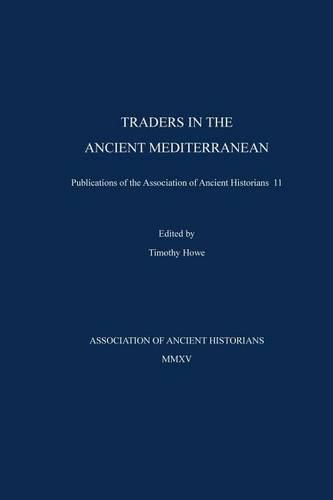Readings Newsletter
Become a Readings Member to make your shopping experience even easier.
Sign in or sign up for free!
You’re not far away from qualifying for FREE standard shipping within Australia
You’ve qualified for FREE standard shipping within Australia
The cart is loading…






Traders in the Ancient Mediterranean presents a framework on which to hang ancient Mediterranean buying, selling, and transporting of goods. In five focused chapters, each written by a field expert, Traders in the Ancient Mediterranean offers a diachronic analysis of the ancient Mediterranean trader from the Late Bronze Age (1500-1100 BCE) through the Roman Imperial period (27 BCE-400 CE). The book focuses on local traditions, embedded historical context and socio-political goals of traders as individual actors, to provide an analysis of the impact of trade on ancient Mediterranean life beyond the traditional boundaries of the economy. As a result, two main types of behavior are analyzed, inter-regional and regional. The political and social developments of the Late Bronze Age and the Hellenistic and Roman periods, characterized by the rise of large multi-regional empires such as Assyria, Babylon, New Kingdom Egypt, Seleucid Syria and Ptolemaic Egypt, facilitated increased volume and demand for long-distance, extra-mural trade. Alternatively, the regionalism of Early Iron Age communities such as the Greek, Etruscan and Phoenician city-states tended to encourage focused exchange onto smaller, local networks to such as degree that larger structures, and longer distance trade were slow to form and thrive. A conclusion that all regions share, however is that ancient Mediterranean traders maintained a general disregard for the laws of supply and demand. Their behavior was dominated by intense official interference (and even competition) by revenue-hungry political entities. Consequently, for the ancient trader and the consumers he (or occasionally she) serviced, the prices of movable goods were always volatile, high risk was always a factor, and the integration of markets into an ordered economy superficial and tentative.
$9.00 standard shipping within Australia
FREE standard shipping within Australia for orders over $100.00
Express & International shipping calculated at checkout
Traders in the Ancient Mediterranean presents a framework on which to hang ancient Mediterranean buying, selling, and transporting of goods. In five focused chapters, each written by a field expert, Traders in the Ancient Mediterranean offers a diachronic analysis of the ancient Mediterranean trader from the Late Bronze Age (1500-1100 BCE) through the Roman Imperial period (27 BCE-400 CE). The book focuses on local traditions, embedded historical context and socio-political goals of traders as individual actors, to provide an analysis of the impact of trade on ancient Mediterranean life beyond the traditional boundaries of the economy. As a result, two main types of behavior are analyzed, inter-regional and regional. The political and social developments of the Late Bronze Age and the Hellenistic and Roman periods, characterized by the rise of large multi-regional empires such as Assyria, Babylon, New Kingdom Egypt, Seleucid Syria and Ptolemaic Egypt, facilitated increased volume and demand for long-distance, extra-mural trade. Alternatively, the regionalism of Early Iron Age communities such as the Greek, Etruscan and Phoenician city-states tended to encourage focused exchange onto smaller, local networks to such as degree that larger structures, and longer distance trade were slow to form and thrive. A conclusion that all regions share, however is that ancient Mediterranean traders maintained a general disregard for the laws of supply and demand. Their behavior was dominated by intense official interference (and even competition) by revenue-hungry political entities. Consequently, for the ancient trader and the consumers he (or occasionally she) serviced, the prices of movable goods were always volatile, high risk was always a factor, and the integration of markets into an ordered economy superficial and tentative.